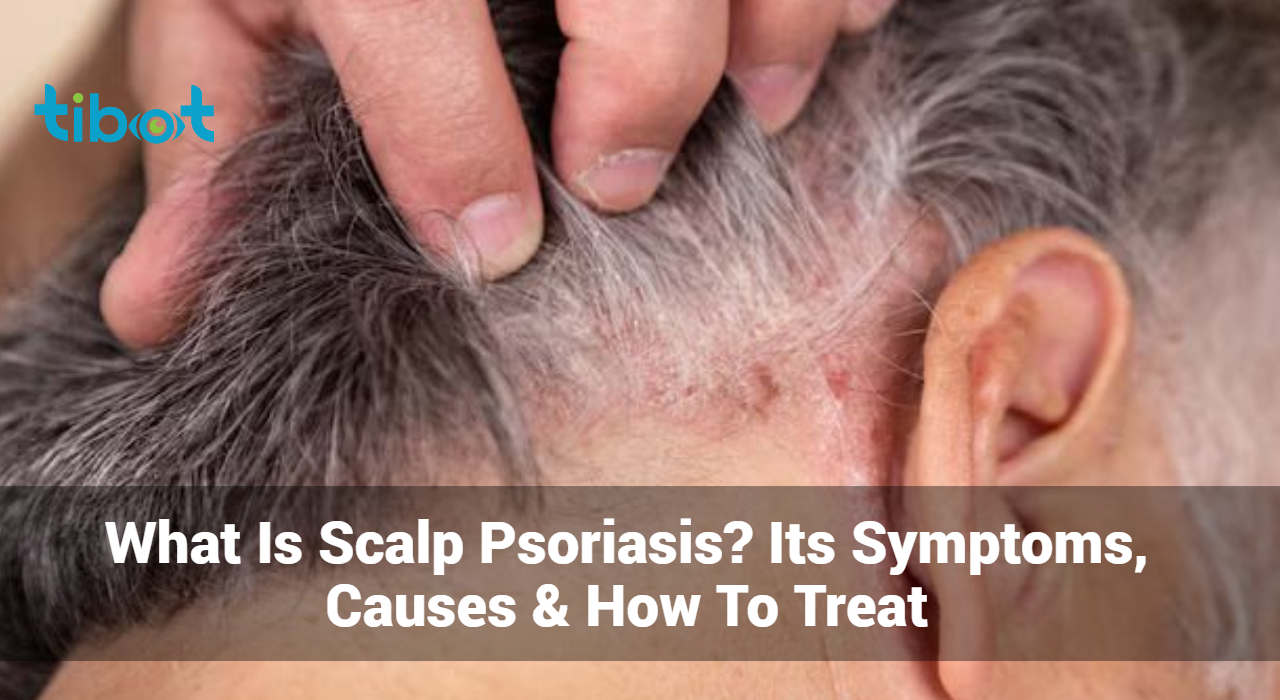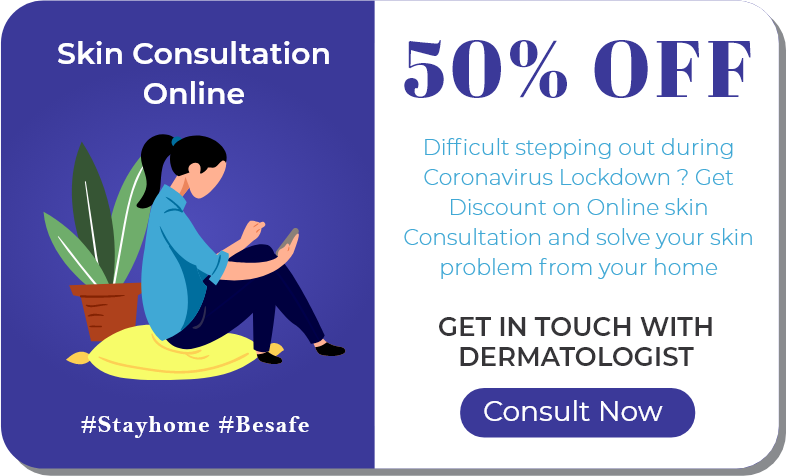What Is Scalp Psoriasis? Its Symptoms, Causes & How To Treat

Scalp psoriasis is a chronic autoimmune skin condition that affects the scalp, causing red, itchy patches with silvery-white scales. While psoriasis can occur anywhere on the body, when it affects the scalp, it can be particularly bothersome due to the discomfort and visible flaking it causes. This article provides a comprehensive look at scalp psoriasis, its symptoms, causes, and the most effective treatment options.
What is Scalp Psoriasis?
Scalp psoriasis is a form of psoriasis, a condition that speeds up the life cycle of skin cells, causing them to build up rapidly on the surface of the skin. This buildup results in thick, scaly patches, often accompanied by inflammation. In the case of scalp psoriasis, these patches form on the scalp, and they can extend beyond the hairline to the forehead, neck, or behind the ears.
How Common is Scalp Psoriasis?
Approximately 50% of people who suffer from psoriasis will develop scalp psoriasis. It affects both men and women equally and can occur at any age, though it is more commonly diagnosed in adults.
What Are The Common Symptoms of Scalp Psoriasis?
Scalp psoriasis symptoms can range from mild to severe. The severity of symptoms often depends on the extent of the area affected and how long the condition has been active. Common symptoms include:
- Red Patches on the Scalp: Red patches of skin covered with thick, silvery-white scales. These patches may be confined to a small area or spread over the entire scalp.
- Scaly Buildup: The buildup of dead skin cells leads to white, powdery flakes, which can often be mistaken for dandruff. In severe cases, the scales can become thick and form crusty plaques.
- Persistent Itching: One of the hallmark symptoms of scalp psoriasis is intense itching, which can range from mild to severe. The itching can become so uncomfortable that it interferes with daily activities.
- Worsening: Scratching may provide temporary relief but can worsen the condition by causing bleeding, further irritation, or infection.
- Dry Skin: The affected areas of the scalp often feel dry and may crack, leading to further irritation.
- Tenderness: The patches of psoriasis can be sore or painful, particularly if they become infected or irritated by scratching.
- Temporary Hair Loss: Although scalp psoriasis itself doesn’t directly cause hair loss, frequent scratching or aggressive treatments may lead to hair shedding. In most cases, hair regrows after the condition is treated.
- Broken Skin: Intense scratching or rubbing the affected area may lead to broken skin and bleeding, making the scalp more prone to infection.
- Secondary Infection: If the skin is broken due to scratching or irritation, there is an increased risk of bacterial infections, which can complicate the condition.
What Causes of Scalp Psoriasis?
The exact cause of scalp psoriasis is not fully understood, but it is believed to be related to an immune system malfunction. In individuals with psoriasis, the immune system mistakenly attacks healthy skin cells, causing them to reproduce at a rapid rate. Several factors can contribute to the onset and exacerbation of scalp psoriasis:
1. Genetics
- Hereditary Factor: There is a strong genetic component to psoriasis, and individuals with a family history of the condition are more likely to develop it.
2. Immune System Dysfunction
- Autoimmune Reaction: Scalp psoriasis is thought to be an autoimmune disorder, where the body’s immune system mistakenly attacks normal skin cells. This accelerates skin cell turnover, leading to the buildup of dead skin cells on the surface.
3. Environmental Triggers
Certain environmental and lifestyle factors can trigger or worsen scalp psoriasis:
- Stress: Emotional or physical stress is a well-known trigger for psoriasis flare-ups.
- Infections: Infections, especially those caused by streptococcus bacteria, can trigger or exacerbate psoriasis.
- Medications: Certain medications, such as beta-blockers, lithium, or antimalarial drugs, may aggravate psoriasis.
- Cold Weather: Dry and cold weather can dry out the skin and trigger or worsen scalp psoriasis.
- Skin Injuries: An injury to the scalp, such as a cut, sunburn, or bug bite, can trigger the development of psoriasis plaques (a phenomenon known as the Koebner effect).
4. Lifestyle Factors
- Alcohol Consumption: Excessive alcohol consumption can exacerbate psoriasis symptoms.
- Smoking: Tobacco use has been linked to an increased risk of psoriasis flare-ups.
Analyze Skin Diseases
Use our AI chatbot to determine your skin condition
How to Treat Scalp Psoriasis?
While there is no cure for scalp psoriasis, several treatment options can help manage symptoms, reduce flare-ups, and improve the appearance of the affected skin. Treatment approaches can vary depending on the severity of the condition.
1. Topical Treatments
A. Medicated Shampoos
- Coal Tar Shampoos: Coal tar is a common ingredient in psoriasis treatments. It helps reduce inflammation, itching, and scaling.
- Salicylic Acid Shampoos: Salicylic acid helps soften and remove scales, making it easier for other medications to penetrate the skin.
B. Corticosteroid Creams and Ointments
- Topical Steroids: These are anti-inflammatory treatments that reduce redness, swelling, and itching. They are often prescribed for short-term use in more severe cases of scalp psoriasis.
- Application: Corticosteroids can be applied as creams, lotions, foams, or gels, depending on patient preference and the extent of the affected area.
C. Vitamin D Analogues
- Calcipotriene: This synthetic form of vitamin D is used in topical treatments to slow the growth of skin cells and reduce scaling.
D. Retinoids
- Topical Retinoids: Vitamin A-based treatments help reduce inflammation and slow the production of skin cells. Tazarotene is a commonly used retinoid for psoriasis.
2. Phototherapy (Light Therapy)
- UVB Light Therapy: This involves exposing the scalp to controlled amounts of natural or artificial ultraviolet light to slow down the growth of affected skin cells.
- Excimer Laser: This is a form of targeted phototherapy that uses a focused laser to treat small patches of psoriasis.
3. Oral or Systemic Medications
A. Oral Retinoids
- Acitretin: Oral retinoids may be prescribed for individuals with severe scalp psoriasis. These drugs help slow down the rapid growth of skin cells.
B. Methotrexate
- Immune Suppression: Methotrexate is an immune-suppressing medication that can reduce the overactivity of the immune system, leading to fewer psoriasis flare-ups.
C. Biologics
- Targeted Therapy: Biologics are a newer class of drugs that target specific parts of the immune system. These drugs, such as adalimumab or etanercept, are injected or infused and are typically used for moderate to severe cases of scalp psoriasis.
Natural Remedies and Home Care For Scalp Psoriasis
A. Aloe Vera
- Moisturizing Effect: Aloe vera can help soothe dry, itchy skin and may reduce irritation.
B. Coconut Oil
- Scalp Softener: Applying coconut oil to the scalp can soften scales, making them easier to remove during shampooing.
C. Tea Tree Oil
- Antimicrobial Properties: Tea tree oil has anti-inflammatory and antimicrobial properties that can help reduce itching and prevent infections.
D. Apple Cider Vinegar
- Scalp Rinse: Apple cider vinegar can help relieve itching and flaking, but it should be diluted with water before applying to the scalp.
5. Lifestyle Adjustments
- Stress Management: Reducing stress through relaxation techniques, meditation, or therapy can help prevent psoriasis flare-ups.
- Dietary Adjustments: A healthy diet rich in anti-inflammatory foods, such as fruits, vegetables, and omega-3 fatty acids, may help manage symptoms.
Conclusion
Scalp psoriasis is a chronic, yet manageable skin condition that can cause discomfort and embarrassment due to its visible symptoms. By understanding the causes, symptoms, and treatment options, individuals can work with healthcare professionals to develop an effective treatment plan to manage flare-ups and maintain a better quality of life. Although there is no cure, with the right combination of treatments and lifestyle changes, scalp psoriasis can be well controlled.
If you’re dealing with scalp psoriasis, consult a dermatologist to discuss the best treatment options for your specific case, and take steps to manage triggers to prevent future flare-ups.





